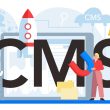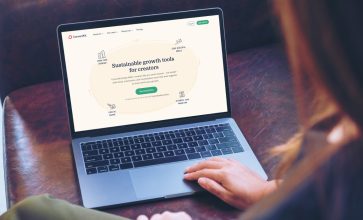ERP Vs CRM: What Is The Difference & Which One Do You Need?
Want to know which one is better: ERP vs CRM? If your answer to this question is a YES, then you have reached the right place!
Software and technology have revolutionized our lives and significantly contributed to the growth of businesses. With the advent of advanced software applications and technological tools, tasks that were once time-consuming and manual have become streamlined and automated, leading to increased efficiency and productivity.
For businesses, software and technology have become indispensable. Enterprise software systems like Customer Relationship Management (CRM) and Enterprise Resource Planning (ERP) streamline operations, automate processes, and centralize data, leading to improved decision-making and resource management.
Advanced analytics tools provide insights into customer behavior, market trends, and business performance, enabling data-driven strategies and informed decision-making. Technology has also expanded business reach through online marketing, e-commerce platforms, and social media, allowing companies to engage with a global audience and expand their customer base.
Keep reading this article till the end to learn more about ERP vs CRM?
Everything You Need To Know About ERP Vs CRM��
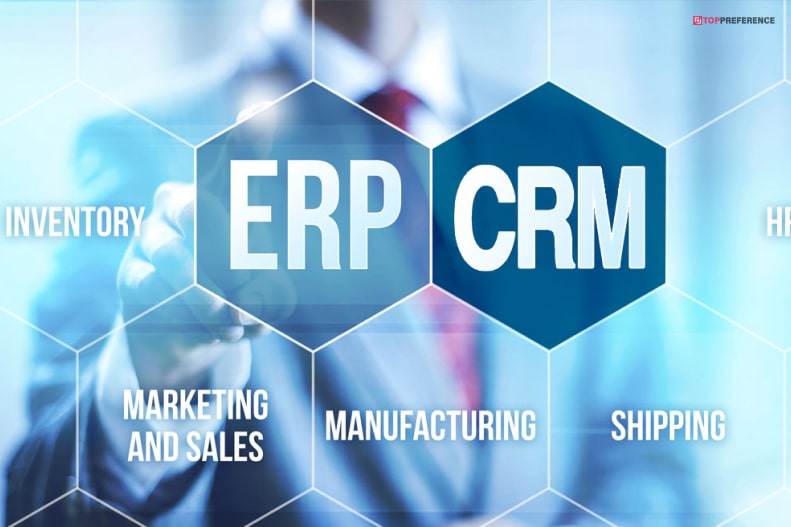
CRM (Customer Relationship Management) and ERP (Enterprise Resource Planning) systems play vital roles in organizations, serving different purposes but working together to streamline operations and enhance overall business performance.
CRM systems focus on managing customer relationships and interactions. They provide tools for tracking customer data, managing leads, automating marketing campaigns, and improving customer service. By centralizing customer information and fostering personalized interactions, CRM systems help businesses build strong customer relationships, improve customer satisfaction, and drive sales growth. This can help in literally all forms of business, from real estate CRMs to hospitality CRM.
On the other hand, ERP systems are designed to integrate and manage various internal business processes. They consolidate data from different departments such as finance, manufacturing, inventory, and human resources, enabling efficient resource allocation, standardized workflows, and real-time visibility into operations. ERP systems optimize operational efficiency, enhance decision-making, and support scalability and growth.
When CRM and ERP systems are integrated, organizations gain a comprehensive view of their operations and customer interactions. The integration allows for seamless data flow between the systems, facilitating efficient order management, accurate demand forecasting, and personalized customer experiences. The combined power of CRM and ERP enables organizations to align their internal operations with customer needs, improve customer satisfaction, optimize resource utilization, and drive business success.
If you want to know which platform or software will suit your company or business better ERP vs CRM, you will need to read this blog till the end?
What Is ERP?��
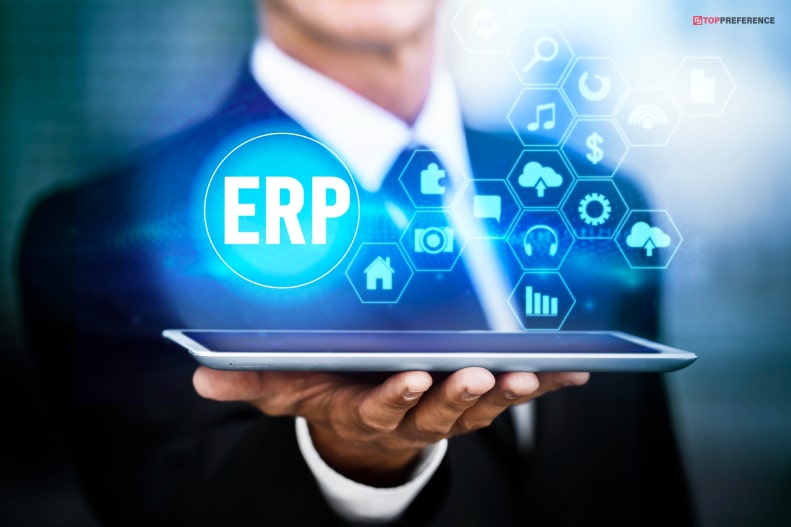
ERP stands for Enterprise Resource Planning. It is a software system that integrates various core business processes and functions of an organization into a centralized platform. ERP software typically includes modules for areas such as finance, human resources, manufacturing, supply chain management, customer relationship management, and more.
The primary purpose of ERP is to enable efficient and effective management of resources, information, and processes across different departments or divisions of an organization. It provides a unified and real-time view of business operations, allowing companies to streamline their workflows, improve collaboration, and make data-driven decisions.
ERP systems facilitate the automation and integration of various business processes, such as inventory management, order tracking, production planning, accounting, payroll, and customer support. By consolidating data and standardizing processes, ERP software helps organizations enhance productivity, reduce costs, improve customer service, and gain a competitive edge in the market.
ERP implementations can vary in size and complexity, ranging from small-scale solutions for specific departments to large-scale, enterprise-wide deployments. The selection and customization of ERP software depend on the unique requirements and goals of each organization.
Benefits Of Using An ERP��
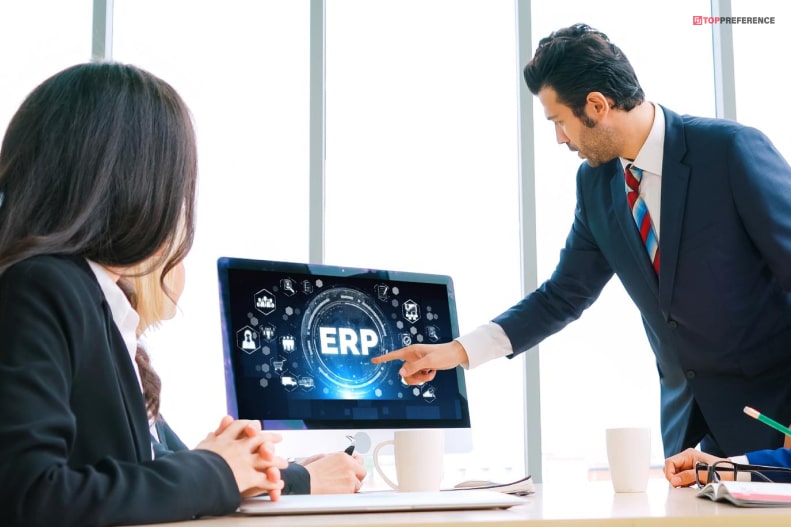
Implementing an ERP system can bring several benefits to an organization. Here are some common advantages of using an ERP:
1. Streamlined Processes��
ERP integrates various business functions and departments, eliminating data duplication and manual processes. It enables streamlined workflows, improves efficiency, and reduces errors and delays.
2. Enhanced Productivity��
With automation and standardized processes, ERP increases business productivity by eliminating repetitive tasks, enabling faster data access, and providing tools for better collaboration and communication within the organization.
3. Real-Time Visibility��
ERP provides a centralized and real-time view of business operations. It allows stakeholders to access accurate and up-to-date information, enabling informed decision-making, resource allocation, and strategic planning.
4. Improved Data Accuracy��
By centralizing data and implementing standardized processes, ERP minimizes data inconsistencies and errors. This enhances the accuracy and reliability of information across the organization.
5. Better Customer Service��
ERP systems often include customer relationship management (CRM) modules, enabling companies to manage customer interactions, sales, and support more effectively. This leads to improved customer service, personalized experiences, and increased customer satisfaction.
6. Cost Savings��
ERP helps in cost reduction by optimizing inventory levels, streamlining procurement processes, minimizing production bottlenecks, and identifying areas of inefficiency or waste. It also reduces IT costs by consolidating systems and eliminating redundant software.
7. Regulatory Compliance��
Many ERP systems incorporate features to facilitate compliance with industry regulations and standards. They provide tools for data security, audit trails, and reporting, helping organizations meet legal and regulatory requirements.
8. Scalability And Flexibility��
ERP systems are designed to accommodate organizational growth and changes. They can easily scale up to support additional users, locations, or business units. ERP also allows customization and integration with other software systems as needed.
9. Data-Driven Insights��
ERP systems offer robust reporting and analytics capabilities. By analyzing data from different areas of the organization, companies can gain valuable insights into performance, trends, and opportunities for improvement.
10. Competitive Advantage��
By streamlining operations, improving efficiency, and enabling better decision-making, ERP gives organizations a competitive edge. It helps them adapt to market dynamics, respond quickly to customer needs, and stay ahead of the competition.
It�s important to note that while ERP systems provide numerous benefits, successful implementation requires careful planning, stakeholder involvement, and change management strategies to ensure effective adoption and utilization of the system.
What Is CRM?��
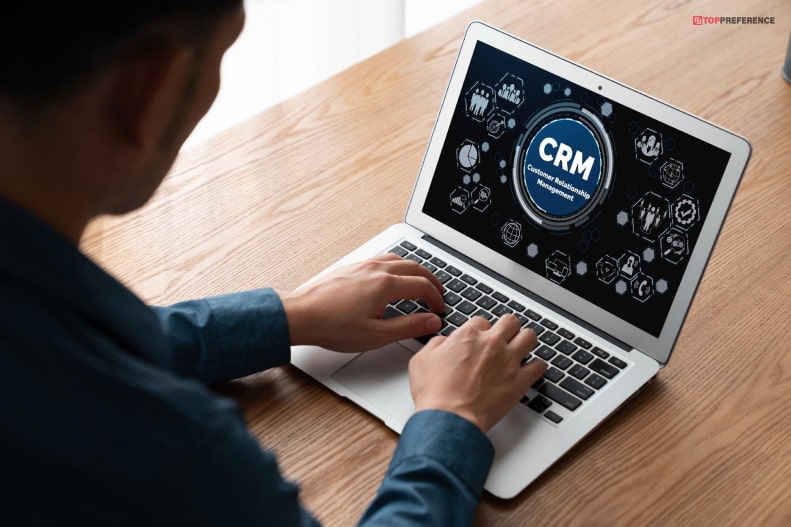
CRM stands for Customer Relationship Management. It refers to both a strategy and a software system designed to manage and nurture customer relationships throughout the customer lifecycle. CRM focuses on acquiring, retaining, and growing customer interactions and aims to enhance customer satisfaction and loyalty.
As a strategy, CRM involves understanding customers� needs, preferences, and behaviors to tailor interactions and deliver personalized experiences. It emphasizes building strong customer relationships by providing value, addressing concerns, and anticipating their needs. CRM strategies often encompass various touchpoints, such as sales, marketing, customer service, and support.
CRM software, also known as CRM systems or CRM solutions, is a technology platform that enables organizations to implement and automate CRM strategies. This software typically includes features and modules for contact management, lead management, opportunity management, sales forecasting, customer service management, marketing automation, and analytics.
Benefits Of Using A CRM��
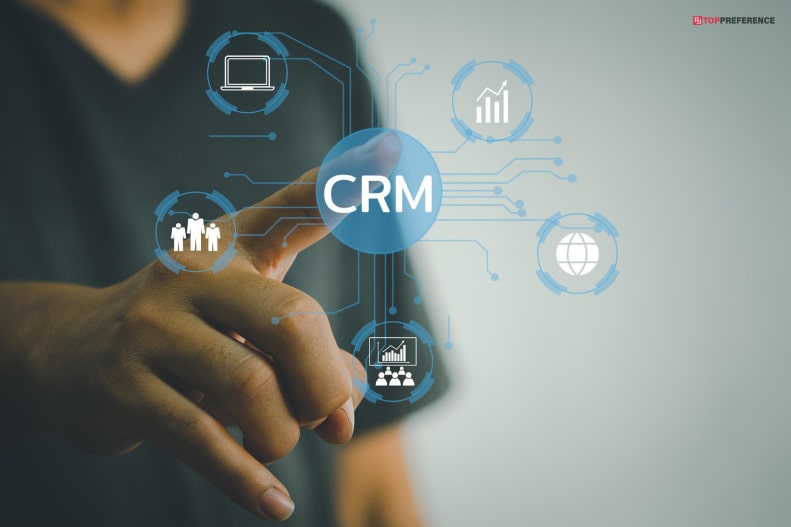
Implementing a CRM system can bring several benefits to an organization. Here are some common advantages of using an CRM:
1. Contact Management��
A CRM system helps to centralize customer data, including contact information, communication history, purchase history, and preferences. This will allow organizations to have a comprehensive view of their customers and effectively manage interactions.
2. Sales Management��
CRM software helps sales teams track leads, manage opportunities, and automate sales processes. It provides visibility into the sales pipeline, sales forecasts, and performance metrics, enabling salespeople to prioritize leads, close deals, and optimize sales efforts.
3. Marketing Automation��
CRM systems often include marketing automation capabilities to streamline marketing campaigns, track campaign effectiveness, and automate lead nurturing. It enables targeted marketing communications, segmentation, and personalized messaging.
4. Customer Service And Support��
CRM solutions provide tools for managing customer inquiries, complaints, and support tickets. They facilitate efficient case management, tracking customer interactions, and ensuring timely and consistent customer support.
5. Analytics And Reporting��
CRM systems offer reporting and analytics features to measure and analyze customer data, sales performance, and marketing effectiveness. This enables organizations to gain insights, identify trends, and make data-driven decisions to improve customer engagement and business outcomes.
6. Collaboration And Communication��
CRM software fosters collaboration and communication among teams by providing a centralized platform to share customer information, notes, and updates. It enhances internal coordination and ensures a unified customer experience across departments.
7. Customer Insights��
By consolidating customer data and interactions, CRM systems enable organizations to gain a deeper understanding of their customers. This includes preferences, behaviors, purchase history, and feedback, helping businesses identify cross-selling or upselling opportunities and tailor their offerings.
8. Improved Customer Satisfaction And Retention��
CRM strategies and software aim to enhance customer satisfaction by delivering personalized experiences, addressing customer needs promptly, and building strong relationships. Satisfied customers are more likely to remain loyal, make repeat purchases, and advocate for the brand.
CRM systems can be customized to fit the specific needs and goals of different industries and organizations. They are widely used across various sectors, including retail, e-commerce, banking, telecommunications, and professional services, to manage customer interactions and drive business growth.
ERP Vs CRM: Which One Do You Need?��
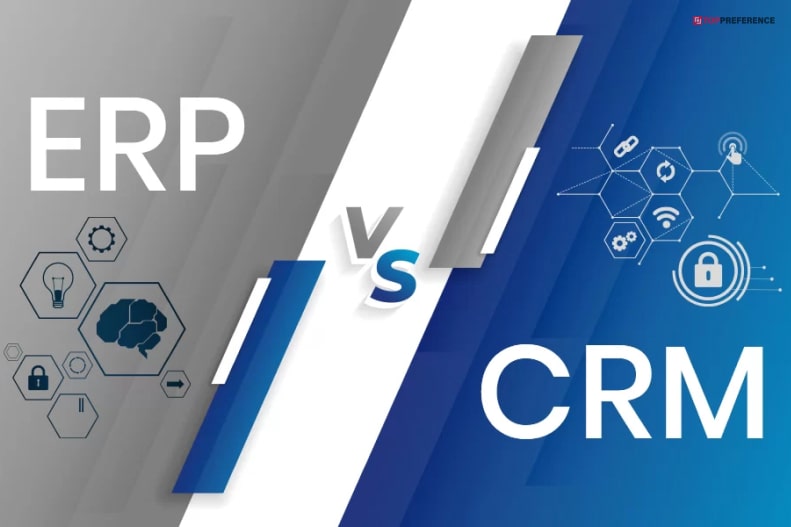
Determining whether your organization needs an ERP (Enterprise Resource Planning) system or a CRM (Customer Relationship Management) system, or both, depends on the specific requirements and goals of your business. Here are some factors to consider when deciding which system is more suitable:
1. Business Focus��
Assess whether your primary focus is on internal operations and resource management or on managing customer relationships. If your main concern is integrating and optimizing various business processes across departments, such as finance, manufacturing, supply chain, and human resources, an ERP system may be more appropriate. However, if your primary objective is to enhance customer interactions, sales, marketing, and support, a CRM system may be the better choice.
2. Operational Complexity��
Evaluate the complexity and scope of your organization�s operations. If you have multiple departments, locations, or business units with complex interdependencies, an ERP system can help centralize data, standardize processes, and improve operational efficiency. On the other hand, if your operations are relatively straightforward and your focus is primarily on managing customer relationships, a CRM system may be sufficient.
3. Data Integration��
Consider the need for data integration across different functions and departments. An ERP system excels at integrating data from various sources and providing a unified view of business operations. If your organization requires seamless data flow and synchronization between departments like finance, manufacturing, and inventory management, an ERP system is likely necessary. A CRM system, on the other hand, focuses primarily on customer data integration and consolidation, providing a holistic view of customer interactions and preferences.
4. Customer-Centricity��
Assess the importance of customer relationships in your business model. If your organization heavily relies on building and maintaining strong customer relationships, a CRM system is crucial. CRM systems enable personalized marketing, effective sales management, efficient and impactful customer service, and targeted customer engagement. They help track customer interactions, manage leads, and improve customer satisfaction and retention.
5. Business Growth Plans��
Consider your organization�s growth plans and scalability requirements. If you anticipate significant growth, expansion into new markets, or an increase in business complexity, an ERP system can provide the scalability and flexibility needed to support your expansion. ERP systems can accommodate additional users, locations, and business units while streamlining processes and enabling efficient resource management. CRM systems can also scale, but their primary focus is on managing customer relationships and may require additional customization for complex growth scenarios.
6. System Integration��
Evaluate the need for integration with existing software systems. If you have already implemented specialized software for finance, manufacturing, inventory, or HR, and you require seamless integration and data flow between these systems, an ERP system can provide a unified platform. However, if your primary concern is integrating customer data and interactions with marketing automation tools, email systems, or other customer-facing applications, a CRM system may be more suitable.
Ultimately, many organizations benefit from using both an ERP system and a CRM system to manage internal operations effectively and customer relationships. In such cases, integration between the two systems is crucial to enable a seamless flow of information. It�s important to thoroughly evaluate your organization�s specific needs, consider future growth plans, and consult with stakeholders to make an informed decision regarding ERP, CRM, or both.
ERP VS CRM Comparison: Which One Is Better For What?��
Determining which is better between ERP (Enterprise Resource Planning) and CRM (Customer Relationship Management) depends on the specific needs and goals of your organization. You might be wondering about the difference between ERP and CRM. You see, these two systems serve different purposes and address different aspects of business operations. Here�s a comparison of their key features and benefits:
| Criteria | ERP | CRM |
| Focus | ERP systems primarily focus on internal operations and resource management | CRM systems primarily focus on managing customer relationships and interactions. |
| Scope | ERP integrates and optimizes various business processes across departments, such as finance, manufacturing, supply chain, and human resources. | CRM systems are designed to enhance customer satisfaction, sales, marketing, and customer support. |
| Key Functions | ERP systems typically include modules for financial management, inventory management, procurement, production planning, human resources, and more. | CRM systems typically include modules for contact management, lead management, opportunity management, sales forecasting, marketing automation, and customer service management. |
| Benefits | ERP systems streamline processes, improve efficiency, provide a unified view of business operations, and help manage resources effectively. They are particularly valuable for organizations with complex operations, multiple departments, and a need for data integration and standardization. | CRM systems help track customer interactions, personalize marketing campaigns, manage sales pipelines, improve customer service, and foster customer loyalty. They are particularly valuable for organizations with a strong emphasis on customer-centric strategies and relationship management. |
While ERP and CRM serve different purposes, they can complement each other when integrated effectively. Many organizations benefit from using both systems to manage internal operations effectively and customer relationships.
When integrated, ERP and CRM systems can provide a holistic view of the organization, enabling efficient data flow and synchronization between internal processes and customer interactions.
ERP VS CRM Bonus: The Best Of Best!��

Now that you know what is the better option for your company between ERP vs CRM, t is time for you to learn about the best platform that you can choose when it comes to these.
Here are the top ten ERP and CRM platforms that you should know about in 2023. Take a look at them before you leave:
5 Best ERP To Know In 2023!��
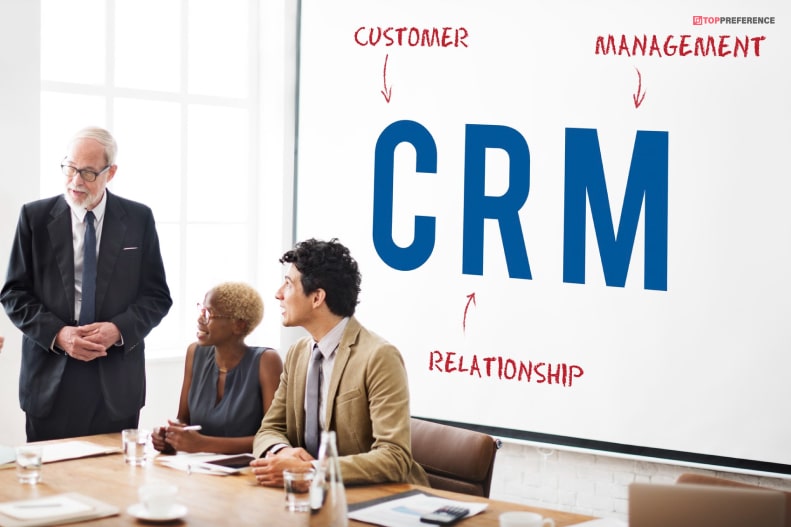
Here are ten popular ERP (Enterprise Resource Planning) systems that have gained significant market presence and are widely recognized:
1. SAP ERP: SAP offers a comprehensive suite of ERP solutions designed for various industries and business sizes. Their ERP system integrates multiple functions, including finance, supply chain management, human resources, and more.
2. Oracle ERP Cloud: Oracle provides a cloud-based ERP platform that offers a range of modules for financial management, procurement, project management, supply chain, and human resources.
3. Microsoft Dynamics 365: Microsoft�s ERP solution, Dynamics 365, encompasses a suite of applications that integrate business processes, including finance, sales, customer service, supply chain, and human resources.
4. Infor ERP: Infor offers a diverse range of ERP solutions tailored for specific industries, such as manufacturing, healthcare, distribution, and hospitality. Eventually, their ERP systems provide functionality across various business processes.
5. NetSuite ERP: NetSuite, now a part of Oracle, offers a cloud-based ERP system that integrates financial management, order management, inventory, procurement, and more. Particularly it is particularly popular among small and medium-sized businesses.
Additional ERP to Know:
6. Epicor ERP: Epicor provides ERP solutions for industries such as manufacturing, distribution, retail, and services. Accordingly, their system encompasses a broad range of modules, including financial management, supply chain, and production management.
7. IFS Applications: IFS offers a comprehensive ERP platform that includes modules for enterprise asset management, project management, supply chain management, and more. It serves industries like manufacturing, construction, and service management.
8. SYSPRO ERP: SYSPRO provides an industry-focused ERP system that caters to manufacturing and distribution businesses. Afterall, their solution offers functionalities for production planning, inventory management, financials, and more.
9. Acumatica ERP: Acumatica offers a cloud-based ERP platform that covers various business areas, including financial management, distribution, project accounting, and customer management. It is known for its flexibility and scalability.
10. Sage ERP: Sage offers a range of ERP solutions tailored for different business sizes and industries. Although, their ERP systems provide functionality for financial management, supply chain, manufacturing, and more.
It�s worth noting that the ERP landscape is dynamic, and the popularity and rankings of specific ERP systems can change over time. It�s advisable to research and evaluate the features, capabilities, industry fit, and customer reviews of different ERP systems to determine the best fit for your organization�s specific needs.
5 Best CRM To Know In 2023!��
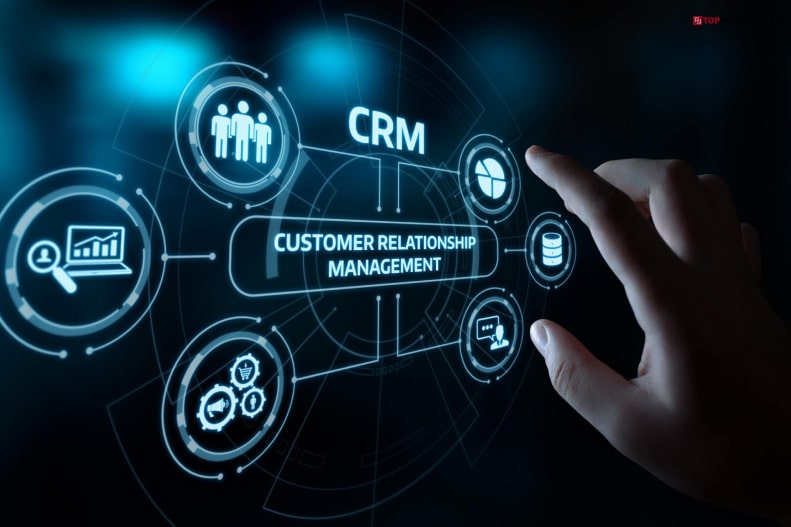
Here are ten popular CRM (Customer Relationship Management) systems that have gained significant market presence and are widely recognized:
1. Salesforce CRM: Salesforce is a leading CRM provider, offering a comprehensive suite of cloud-based CRM solutions known for their scalability, customization options, and extensive feature set.
2. HubSpot CRM: HubSpot offers a free CRM platform that integrates with their marketing and sales tools. It provides features for contact management, pipeline tracking, email integration, and more.
3. Microsoft Dynamics 365 CRM: Microsoft�s CRM solution, Dynamics 365 CRM, is a comprehensive platform that integrates with other Microsoft products. Generally, it offers features for sales automation, customer service, marketing, and analytics.
4. Zoho CRM: Zoho CRM is a cloud-based CRM system that provides a range of modules for contact management, lead generation, sales pipeline tracking, and customer support. It offers various pricing tiers to cater to different business sizes.
5. Oracle CX Cloud: Oracle�s CX Cloud suite includes a robust CRM system that offers features for sales, marketing, service, and commerce. It integrates with other Oracle applications to provide a complete customer experience platform.
Additional CRM to Know in 2023:
6. Pipedrive: Pipedrive is a popular CRM system focused on sales management. It offers pipeline tracking, deal management, and email integration, providing a user-friendly interface for sales teams.
7. SAP Sales Cloud: SAP Sales Cloud is part of SAP�s CRM portfolio, providing tools for sales automation, lead management, and customer engagement. Consequently, it integrates with other SAP solutions to facilitate end-to-end customer management.
8. SugarCRM: SugarCRM offers a flexible and customizable CRM platform that includes features for sales, marketing, and customer service. In addition, it provides both on-premises and cloud deployment options.
9. Freshworks CRM: Basically, freshworks CRM (formerly Freshsales) is a cloud-based CRM system that offers features for contact management, lead scoring, sales automation, and email tracking. It is designed for small and mid-sized businesses.
10. Insightly CRM: Insightly is a CRM system that caters to small businesses and offers features for contact and pipeline management, task automation, and email integration. Above all, this also includes project management capabilities.
Note:
Please note that the CRM market is dynamic, and the popularity and rankings of specific CRM systems can change over time. It�s advisable to research and evaluate the features, pricing, integration capabilities, and customer reviews of different CRM systems to determine the best fit for your organization�s specific needs.
Wrapping It Up!��
In conclusion, the choice between ERP and CRM depends on your organization�s specific requirements and priorities. Furthermore it assess your business focus, operational complexity, customer-centricity, growth plans, and integration needs to determine which system or combination of systems would be more beneficial for your organization�s overall success.
Additionally, if you were searching for a comparison between ERP vs CRM, I hope that this article has been of help to you. If there are any other queries related to the same, feel free to let me know. Moreover, if you need to do is scroll down till you reach the bottom of the page, Then leave your queries and suggestions in the comment box below. And I will be there to answer them all for you!
More Resources:



